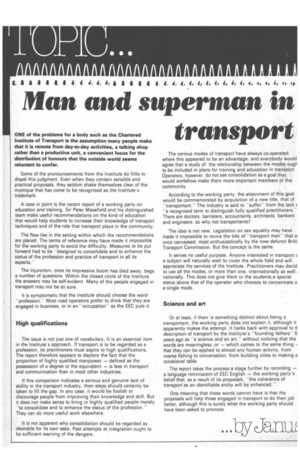Man and superman in transport
Page 86

If you've noticed an error in this article please click here to report it so we can fix it.
ONE of the problems for a body such as the Chartered Institute of Transport is the assumption many people make that it is remote from day-to-day activities, a talking shop rather than a productive unit, a convenient focus for the distribution of honours that the outside world seems reluctant to confer.
Some of the pronouncements from the Institute do little to dispel this judgment. Even when they contain sensible-and practical proposals, they seldom shake themselves clear of the mystique that has come to be recognised as the Institute's trademark
A case in point is the recent report of a working party on education and training. Sir Peter Masefield and his distinguished team make useful recommendations on the kind of education that would help students to increase their knowledge of transport techniques and of the role that transport plays in the community.
The flaw lies in the setting within which the recommendations are placed. The terms of reference may have made it impossible for the working party to avoid the difficulty. Measures to be put forward had to be "designed to consolidate and to enhance the status of the profession and practice of transport in all its aspects.'" The injunction, once its impressive boom has died away, begs a number of questions. Within the closed circle of the Institute the answers may be self-evident. Many of the people engaged in transport may not be so sure.
It is symptomatic that the Institute should choose the word "profession." Most road operators prefer to think that they are engaged in business, or in an -occupationas the EEC puts it.
High qualifications
The issue is not just one of vocabulary. It is an essential item in the Institute's approach. If transport is to be regarded as a profession, its practitioners must aspire to high qualifications. The report therefore appears to deplore the fact that the proportion of highly qualified manpower — defined as the possession of a degree or the equivalent — is less in transport and communication than in most other industries.
If this comparison indicates a serious and genuine lack of ability in the transport industry, then steps should certainly be taken to fill the gap. In any case, it would be foolish to discourage people from improving their knowledge and skill. But it does not make sense to bring in highly qualified people merely -to consolidate and to enhance the status of the profession." They can do more useful work elsewhere.
It is not apparent why consolidation should be regarded as desirable for its own sake. Past attempts at integration ought to be sufficient warning of the dangers. The various modes of transport have always co-operated where this appeared to be an advantage; and everybody would agree that a study of the relationship between the modes ouglto be included in plans for training and education in transport. Operators, however, do not see consolidation as a goal that would sorrfehow make them more important members of the community.
According to the working party, the attainment of this goal would be commemorated by acquisition of a new title, that of "transportant." The industry is said to "suffer" from the lack c "a recognised term to distinguish fully qualified practitioners.There are doctors, barristers, accountants, architects, bankers and engineers: so why not transportants?
The idea is not new. Legislation on sex equality may have made it impossible to revive the title of "transport man" that vs once canvassed, most enthusiastically by the now defunct Britii Transport Commission. But the concept is the same.
It serves no useful purpose. Anyone interested in transport E a subject will naturally wish to cover the whole field and will appreciate the services of the Institute. Practitioners may decid to use all the modes, or more than one, internationally as well nationally. This does not give them or the students a special status above that of the operator who chooses to concentrate o a single mode.
Science and art
Or at least, if there is something distinct about being a transportant, the working party does not explain it, although it apparently makes the attempt. It harks back with approval to ti description of transport by the Institute's "founding fathers" 6 years ago as "a science and an art," without noticing that the words are meaningless, or — which comes to the same thing that they can be applied to almost any human activity, from coarse fishing to conversation, from building cities to making a occasional table.
The report takes the process a stage further by recording — a language reminiscent of EEC English — the working party's belief that, as a result of its proposals, "the coherence of transport as an identifiable entity will be enhanced.'" One meaning that these words cannot have is that the proposals will help those engaged in transport to do their job better, although this is surely what the working party should have been asked to promote.
...by jalaU
































































































































